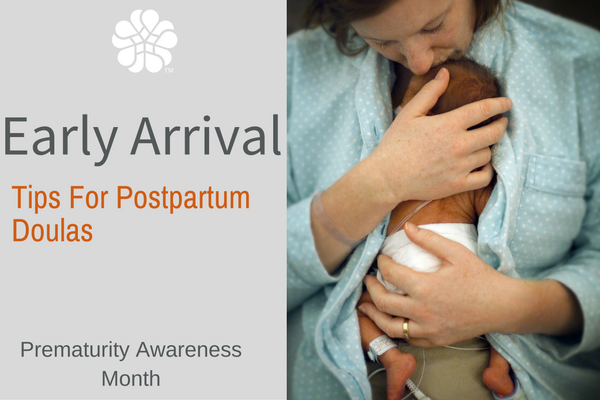Supporting a family with a premature baby bring special considerations, challenges, and opportunities for doulas. We have previously shared tips for birth doulas in When a Premature Birth Seems Likely. Here postpartum doula trainer Kathrin Auger shares her insights to help postpartum doulas provide support in this unique situation. — AG
Premature Baby: What the Postpartum Doula Can Expect
Premature babies might still have difficulty maintaining their body temperature after coming home from the hospital. Hypothermia (low body temperature) can lead to breathing problems, as well as low blood sugar. A preemie may use up all the energy gained from a feeding just to keep the body temperature high enough. Therefore, they don’t grow easily and need help maintaining body heat.
Skin-to-skin contact is one of the fastest ways to help baby regain a good body temperature. Studies show that at times it works faster than an isolette/incubator or a warmer in the hospital. Baby’s sense of smell is entirely developed, which helps baby identify who their parents are and are therefore comforted. It also calms down the nervous system of both baby and parent and releases hormones that counteract stress hormones in the brain of both people involved. It becomes a crucial component of the child’s well being and the parents’ ability to bond with the child. Skin-to-skin also increases a mother’s breastfeeding success rate.
Premature babies are at greater risk for health complications than full term babies. They are more prone to infection, for example. Baby might be prone to asthma and other respiratory issues. Premies are also more prone to SIDS, which the doulas need to be well informed about to help guide the parents and alleviate other SIDS risks factors. Health issues or prematurity may also make breastfeeding more difficult and assistance may be needed from a lactation consultant.
Doulas need to be informed about the baby’s progress, and sometimes be brought up to speed by parents and/or health care professionals on the proper care of the child. Some preemies come home with feeding tubes, medication, therapeutic treatment plans, heart monitors, etc. Doulas have to find a way to support the clients while staying within scope for a postpartum doula.
If the child is in the Neonatal Intensive Care Unit (NICU) for a long time and/or comes home with compromised health, the doula may be working longer hours and for a longer period of time with the family. The tricky part can be the schedule for when baby comes home and whether or not the doula is still available during that time. I would suggest the doula stay open for the return of the baby as this family will need her support. If necessary, maybe she can send a back-up to her next client. If the back-up doula has relevant experience, the doula might choose to send her to the client with the preemie. In either case, scheduling the homecoming of a baby that has had a hospital stay will require a lot of flexibility on the doula’s part.
An Early Arrival: What it Means for the Family
When we think of the birth of a baby, we think of joy and celebration. For the parents of a premature baby, joy is likely mixed with other strong emotions, such as anxiety and fear. The parents may have had a hard start into their parenting journey and may be going through a grieving process. They have lost the last weeks and months of their pregnancy and the chance to properly prepare mentally and physiologically. The postpartum doula needs to understand this and help parents adjust to their new situation and support them through their grieving process by giving them time and understanding. There may be health concerns for the baby – some of them significant. Expect that parents may be over cautious, worry easily, and more likely to check in with their pediatrician than parents of full-term babies. This may be true even for the parents of infants who do not have serious health complications. Doulas again need to show compassion, support appropriate and evidence-based information gathering, and help nurture the relationship between parents and pediatrician. Parents might have had issues with bonding due to baby being on the NICU over a long time. Older siblings and other family members might not have had a chance to bond properly either and need help from the doula to do so.
How Doulas Can Support the Family of a Preemie
While it may be tempting to want to reassure your client, it’s very important that the doula doesn’t make any promises to the family as this is, unfortunately, not always guaranteed. I would also suggest that the doula does not make any religious comments such as “It was God’s will,” or “With God’s will, your baby will be okay,” as not all parents will have the same belief system as the doula, and it might come across as judgmental on the doula’s part. As doulas we are supporting our clients in a non-judgmental way at all times.
Support During a NICU Stay
Doulas can help inform the parents about their right to be included as much as possible in child care during the stay in the NICU, i.e. diaper change, calming baby down, breastfeeding if possible, and doing as much skin-to-skin as possible, which will also help with the bonding experience. Parents may also be able to bring a t-shirt or other clothing item that has their smell on it for the baby to have close by as well as clothes for baby to wear while staying in the hospital. Parents have the right to be informed about all that is happening with their child and should be able to ask as many questions as needed be in order to be fully informed about their child’s well-being. If parents are unavailable to spend time with the child, the NICU often allows parents to list two other people who can be with the child without the parents present. Siblings are also usually welcome to visit. Alternative treatment options such as acupuncture or craniosacral therapy may be allowed in the hospital. If needed, parents have the right for a second opinion. It can be helpful to gently remind parents that the doctors in the NICU are neonatologists, which means they are pediatricians specializing in prematurity and underdeveloped, sick children. A regular out-of-hospital pediatrician might not have the knowledge nor the expertise to answer specific questions or make recommendations about their child’s health at this stage.
Emotional Support
When our clients go through a grieving process, doulas provide emotional support in the following ways:
- reflect back what the parents have shared,
- use open-ended and tentative statements,
- make a tentative summary of the information shared,
- use attentive silence,
- be compassionate,
- don’t try to make the parents feel better,
- accept that they will be sad, and
- learn to sit with them during their grief.
If parents worry over much, the doula can point out all the ways in which the baby is developing properly. Examples may include baby is turning her/his head when they hear the parent talk, cries when hungry, tired, and/or overwhelmed, calms down in parents arms (sometimes with the doula’s help), has an appropriate response after being fed, wakes up frequently for feedings, stays awake longer as baby gets older, tracks things with his/her eyes, startles when there is a loud noise, and baby is gaining weight. These are all good ways for the parents to see that their baby is developing well and growing as needed. It also shows that the parents are taking good care of their child and that their child thrives in their care. That confidence can help tremendously with bonding.
Support Bonding with Siblings & Extended Family
Older siblings and other family members can hold the baby once the baby is released from the hospital. They can get involved in childcare at home, take baby on walks, and lend an extra hand so the parents can take a shower, eat something, or have a moment to themselves. It gives these other family members an opportunity to bond with the baby as well.
Resources
There are extensive online resources for specific medical conditions that may help both the doula and the family. As always, look for evidence-based resources from reliable sources. Support groups both online and in-person can provide an important source of connection and help parents navigate the medical system.
March of Dimes offers a number of resources on prematurity including articles, Twitter chats, and a blog. This is a highly respected resource that goes out of their way to make sure their information is very readable for non-medical professionals.
The National Coalition for Infant Health’s mission is education and advocacy on behalf of premature infants and their website also offers information and resources. Included in their resources for parents list are organizations that provide financial support for medical expenses for families with a premature baby, advocacy organizations, and more. Their resources for professionals includes links to regional organizations focused on prematurity (scroll to the bottom).
A toolkit for transitioning home from the NICU is available from the Agency for Healthcare Research & Quality, which operates under the U.S. Department of Health & Human Services. It includes information sheets on specific conditions or situations such as a feeding tube.
About the Author
Kathrin Auger was first called to the perinatal field in 1993 while in Switzerland working as an NICU nurse. She retired from nursing after her move to the United States in 2002. Her years of conventional medical training fed her desire to step outside the typical medical model and go deep into more personal care during the perinatal period. She is a DONA International certified and postpartum doula and became a DONA International approved postpartum doula trainer in 2007. Kathrin has also acquired other certifications in the childbirth field. She is passionate about helping parents have a smooth transition into parenthood and committed to supporting them with informed decision-making. Kathrin lives a life full of laughter with her husband and two boys in Los Angeles, CA.



